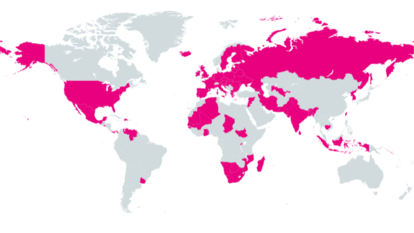Political Communication
2024, the super-electoral year. Why (re)framing matters more than ever

In 2024, about half of the world's adult population (4.2 billion people) will cast a vote. In 65 countries, the citizens will participate in this electoral ritual, which is meant to renew our faith in the democratic process. As some have called it, 2024 is the year of the vote. However, the discussion around this electoral overdose is not infused with hope and optimism, but rather with apprehension. Democracy is at stake in the 2024 US election, a Chatham House analysis states, encapsulating the angst that has come to define our key political moments.
Perhaps this approach to the 2024 elections is not wrong. The recent Dutch elections demonstrated that things can go wrong and how the populists can win a plurality of votes and have the chance to govern and implement their exclusionary (to say the least!) policies. To be honest, never since the end of the Cold War has liberal democracy been more contested. One cannot deny the facts. However, we, as believers in the liberal democratic norms, have agency and a choice to make: either we give up and hope for the best or we try to redefine the situation in our favor.
The malicious use of Artificial Intelligence and technology, culture wars, disinformation, and even cyberattacks will be on the menu in this year's elections. We should not assume that illiberal forces will become complacent. We can expect the worst in this super-electoral year. The key question is how to act and react. My argument, as a strategic communication specialist, is straightforward. In addition to the classical art of great campaigning, we should invest in better preparation, so that we can get a better sense of what is coming against us, and emphasize more sense, sensibility, and simplicity in our communication. Easy to say and hard to do, but let's give it a try.

2024: The Ultimate Election Year Around the World: National elections are scheduled or expected in at least 64 countries, as well as the European Union, which all together represent almost half the global population.
© Friedrich Naumann Foundation for FreedomFor starters, it is crucial to recognize that elections are won through the power of votes, and securing those votes hinges on winning the hearts and minds of the electorate. Voting, fundamentally, is an emotional act, and the most effective way to appeal to a voter's sentiments is through the art of framing and reframing.
But what exactly are frames? Framing revolves around highlighting the essence of an issue rather than focusing on its specific aspects. The foundation of framing theory lies in the idea that the media directs attention to certain events and then places them within a context of meaning. Framing holds immense significance because it can wield substantial influence, and consequently, the concept of framing extends to encompass organizations as well. Essentially, framing theory posits that the way something is presented to an audience, known as "the frame," shapes how people choose to process that information. Frames wield a profound influence on how news is perceived by the audience. But why is it imperative to employ frames during a campaign, especially in a crucial electoral year like 2024?
Leaders often set the tone and serve as role models, and people tend to emulate them. Consequently, how a given situation is interpreted frequently hinges on the leader's framing of that particular problem or challenge. For instance, consider a standard political message addressing a nation's issues like economic problems and poverty. An effective frame here could shift the focus directly onto the voters' specific concerns, emphasizing that it is insufficient to merely love the country when empty stomachs persist. This straightforward message carries a substantial impact, as it reframes the issue by aligning poverty with nationalism.
Another compelling reason to utilize frames and reframing is that framing not only influences but also distorts our perceptions. Proficiency in framing is vital because frames fundamentally shape and, at times, warp our view of situations (and how blame and credit are assigned), thereby influencing subsequent actions. For example, let's examine the following statement: "We live in a good country! We've made progress over the last few years!" A potent reframe here could counter that progress should entail moving forward, not backward.
It is crucial to remember that frames function as filters for our minds. Each time we employ a frame, we exercise control over the information that is conveyed. It's essential to keep in mind that no single window can reveal the entire panorama. Frames themselves often remain elusive. Just as we must step back from a window to discern its presence, we need to "step back" from our frames to realize that we are perceiving the world through a particular perspective. For instance, when a candidate discusses economic measures in a country, effective framing might redirect the conversation toward social or systemic issues.
Frames simplify the complexities of the world. They do not encapsulate the entirety of reality, leaving gaps in understanding. However, because our minds tend to fill in these gaps, we often fail to notice anything missing. For instance, when a politician highlights the success of their campaign, a potent framing could juxtapose it with negative examples, illustrating that progress in economic revenues alone does not equate to overall societal well-being. The reframe here is that progress should encompass both economic prosperity and social welfare. Crucially, frames can be stubborn and resistant to change. Once we become locked into a frame, shifting it can be challenging, especially without conscious effort. When individuals form emotional attachments to their frames, altering them may even be perceived as a threat.
In conclusion, what is the most effective approach? Always employ metaphorical (by this I mean memorable, not overly sophisticated and ultimately difficult to understand) language to shift the narrative, presenting your vision instead of the opponent's agenda. Utilize narratives to convey your frames and consistently incorporate contrast. You can borrow contrast, but craft the message to your advantage, becoming popular while avoiding to be a populist.
Is there a simple way to do this? I will provide a framework of guidance, which in my experience, works. I call it the RED mental model, because in incorporates Reality, Emotion, Direction. If you structure your messages taking into consideration reality, emotion and you provide direction, on any topic of local or national or global issue, you will have success in framing your message and reframing your political opponent's ones. How does it work? For each of the 3 pillars pick up to 3 words that come to your mind: for example for "cost of living" on the Reality side, at least 3 words come to my mind (hard, poverty, crises), on the Emotion side as well (fear, anger, hope), and in terms of Direction, what I expect from leaders/ the future, I can also imagine some "words that work" (action, protection, speed). If you combine the three, magic happens, since people will recognize that you are in touch with reality, you feel them emotionally, and can provide direction (a key element of leadership). "People are affected by crises. They are rightfully angry but there is hope. We need action, we will provide protection, and fast" may be better than a more sophisticated pitch to win people's hearts and minds.
Ultimately, leadership entails not only garnering followers but also persuading them. Framing and reframing the political narrative are powerful tools for convincing people, for it is through these techniques that leaders shape perceptions and win hearts and minds. Let's hope that the liberal forces will make good use of framing and reframing this year and will use it on the offensive, not the defensive flank.
About the Author
Radu Magdin is a Romanian consultant and trainer, former Prime Ministerial adviser in Romania and Moldova. Radu is a co-facilitator at IAF's yearly Liberalism vs Populism program and a co-author of FNF's Playbook on Liberal Leadership and Strategic Communications in the Covid-19 Era.
